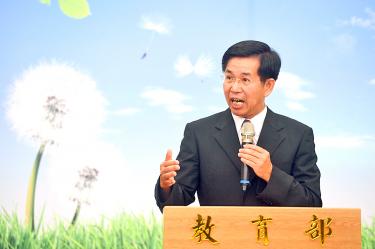The Ministry of Education is to take swift action to abolish contentious social studies and Chinese literature curriculum guideline changes passed in 2014, in accordance with a resolution passed by the legislature and approved by the Executive Yuan, Minister of Education Pan Wen-chung (潘文忠) said yesterday.
Pan made the announcement at a news conference, where he gave an overview of the education platform espoused by President Tsai Ing-wen’s (蔡英文) administration.
“The alteration of the curriculum guidelines has been deemed unnecessary by society and the unjustified staffing of the curriculum review committee has sparked widespread criticism,” Pan said.
To ensure the fairness of college entrance exams, he said that the ministry would make sure that the College Entrance Examination Center does not give students test questions originating from materials produced according to the 2014 guidelines that are missing in the earlier 2011 guidelines or vice versa, adding that the ministry would respect the choice of high schools that have already decided to use textbooks based on the new guidelines.
Regarding new guidelines being designed for the 12-year national education system, which is scheduled to be implemented in 2018, Pan said new Chinese literature and social studies guidelines would be delayed until 2020 to provide sufficient time for their creation and passage of an amendment to the Senior High School Education Act (高級中等教育法).
The amendment would change regulations governing the establishment of curriculum review committees and the selection of committee members, he said.
The ministry plans to increase its budget by 0.5 percent to aid efforts to bridge a gap in education provided between high schools and vocational high schools, enabling students to attend high schools in their neighborhoods instead of vying for prestigious schools, which would allow for high-school entrance examinations to be waived, Pan said, adding that such a step is crucial to capturing the essence of the 12-year national education system.
Progress stalled on waiving high-school entrance exams because of the previous administration’s desire to maintain stratification between schools, particularly in municipalities and counties where competition is intense, which resulted in an all-or-nothing situation in most administrative divisions, he said.
The ministry plans to expand the exam-waiving scheme by first implementing it at select high schools it deems suitable for the program and gradually increasing the number of institutions after assessments have been made, he said.
Due to an insufficient budget to help universities facing closure reinvent themselves, the ministry plans to invest NT$5 billion (US$152.7 million) to assist in the transformation of those institutions, Pan said.
Pan said the ministry would enforce the Private School Act (私立學校法) to ensure that school assets are reinvested into education to serve public interests after a private university is closed and ensure that students from those institutions are transferred to suitable schools.
The ministry will honor a promise Tsai made during her election campaign to enable more students to apply what they learn in university to their careers, he said.
Citing as an example business-academia cooperative internships he helped initiate as deputy mayor of Taichung, the nation’s bicycle manufacturing hub, Pan said many vocational school students applied for internships at bicycle companies after graduation to gain hands-on experience.
Due to the way evaluations were designed, many high schools and universities place a disproportionately higher level of importance on students’ academic performance, but neglect practical skills, Pan said.
He added that the ministry would seek to encourage ties between the private sector and higher-learning institutions to provide students with more opportunities to take part in internship programs.
Asked what his ideals for education were, Pan said he hoped to allow students aged 12 to 18 to explore the world and gain knowledge by lightening their burden from studying and tests, which he said required a systematic change in teaching methodology.
Source: Taipei Times - 2016/05/22





















